The poultry industry in India is booming, with contract poultry farming becoming an increasingly popular option for those looking to get involved. But what exactly is contract poultry farming? How does it work? And what are the pros and cons? In this blog post, we’ll look at all these questions and more, giving you a comprehensive overview of contract poultry farming in India. So whether you’re considering getting involved in the industry or simply curious to know more, read on.
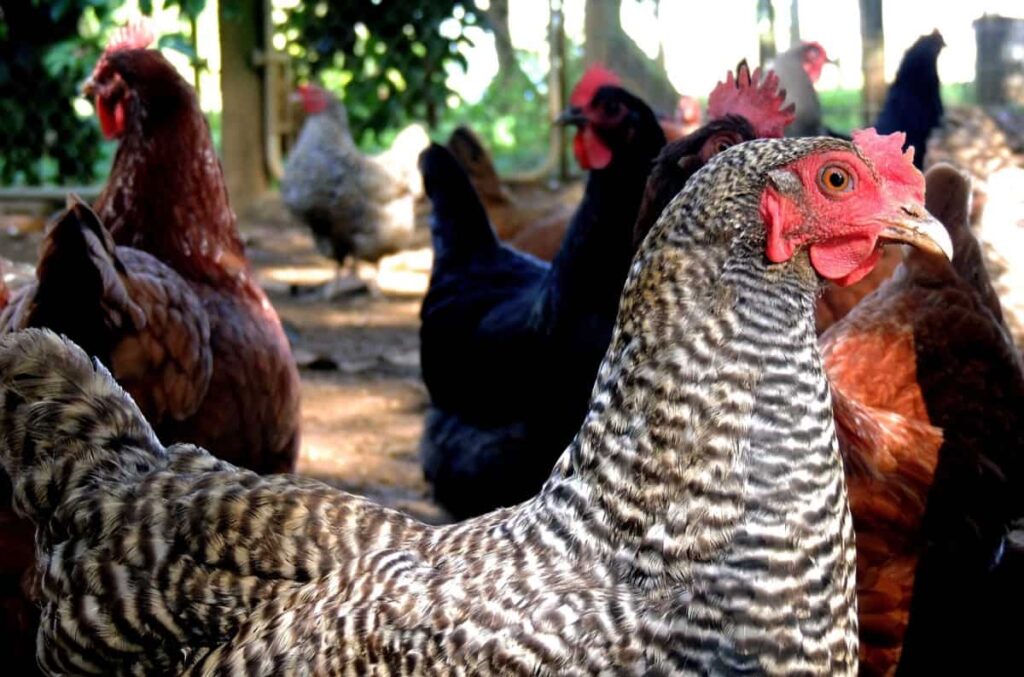
Contract poultry farming in India
Poultry farming business plan in India
India’s poultry industry has grown rapidly and is now worth Rs 40,000 crore. There are more than 5,000 poultry farms in India. The majority of these farms are located in the states of Maharashtra, Andhra Pradesh, Tamil Nadu, Karnataka, and Kerala. Contract poultry farming is a type of poultry farming where the farmer agrees to raise birds according to the company’s specifications.
The company provides day-old chicks, feed, and vaccines. The farmer is responsible for housing, feeding, and watering the birds. The company pays the farmer a fixed price per kilogram of live-weight chicken delivered to them.
Advantages of contract poultry farming
- The farmer does not have to invest in infrastructure or hatcheries.
- The company bears the risk of disease.
- The farmer does not have to worry about marketing the chickens as the company will buy them at a pre-agreed price.
Disadvantages of contract poultry farming
- The farmer has no control over how the chickens are raised and what they are fed.
- The farmer may not be paid on time or at all if the company goes out of business.
- The farmer may be required to use harmful chemicals and antibiotics to meet the company’s standards.
Poultry farming training in India
Poultry farming in India is a rapidly growing industry, and there is a great demand for skilled farmers. The government of India offers many programs and courses to train farmers in this field. Some private companies also offer poultry farming training. The course covers poultry breeds, housing, feeding, management, health, and marketing. In addition, farmers learn about the different stages of chicken production, from hatching to slaughter.
In case you missed it: Understanding Backyard Poultry/Chicken Farming at Home: Check How this Guide Helps Beginners
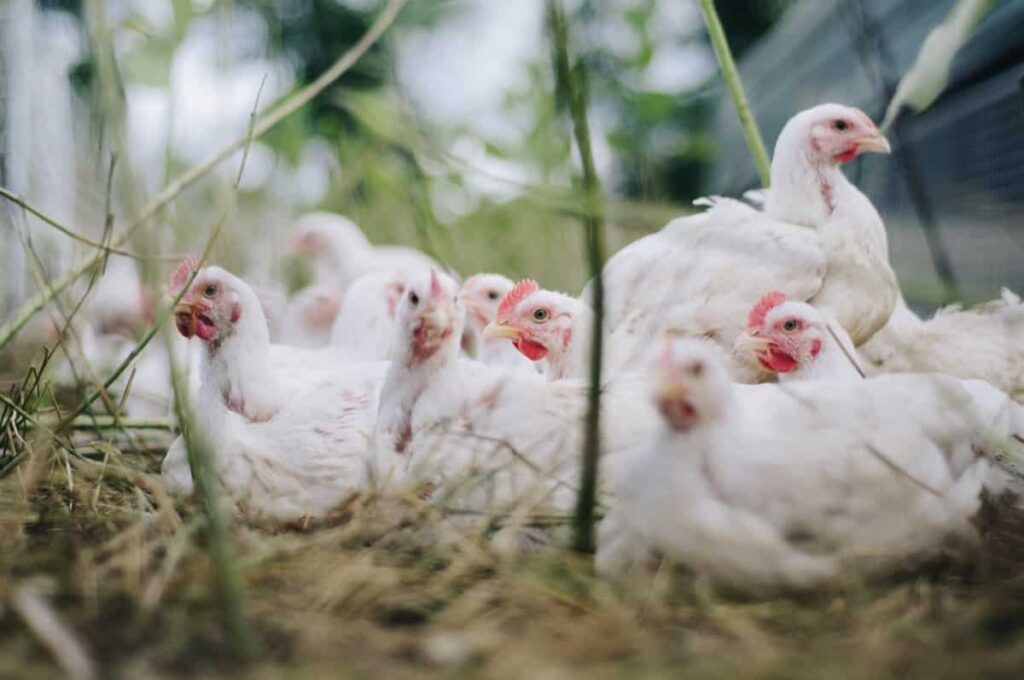
They also learn how to care for the birds and keep them healthy. After completing a poultry farming training program, farmers can start their farms or work for contract poultry companies. Contract poultry companies provide all the necessary equipment and inputs to farmers, and they buy back the birds at a predetermined price.
This arrangement allows farmers to focus on raising the birds without worrying about marketing or selling them. There are both advantages and disadvantages to contract poultry farming. On the one hand, it is a convenient way for farmers to get started in the industry with little investment. On the other hand, contract farmers may make less money than they would if they were running their farms.
Poultry farming license in India
To start a poultry farm in India, you must obtain a state government license. The process for obtaining a license varies from state to state, but generally includes registering your business, paying a fee, and completing an inspection. Once you have obtained your license, you will need to renew it yearly. Poultry farming is a regulated industry in India, so it is important to ensure that you follow all of the necessary steps to obtain a license.
The first step is registering your business with the Registrar of Companies (ROC). Next, you will need to pay a fee to the Department of Animal Husbandry. After that, you will need to complete an inspection by the department to ensure that your facility meets all of the necessary standards. Once you have passed the inspection, you will be issued a license which must be renewed every year.
Poultry farming can be a rewarding and lucrative business, but it is important to ensure that you follow all of the rules and regulations to avoid penalties. By obtaining a poultry farming license, you can be sure that you are operating your business legally and responsibly.
Cost of poultry farming in India
The cost of poultry farming in India can vary significantly depending on the scale of the operation and the region where it is located. For small-scale farmers, raising chickens can be as low as Rs 50 to 75 per bird. However, large-scale commercial operations can cost upwards of Rs 10 lakhs per month. Most of the costs associated with poultry farming in India are for feed and chicks. Other significant costs include housing, labor, transportation, and medications.
Contract poultry farming is an agreement between a company and a farmer to raise chickens according to the company’s specifications. The farmer is typically responsible for providing housing, feed, water, and other necessary inputs, while the company provides day-old chicks, vaccines, and technical support. Under this arrangement, the farmer agrees to sell the broiler chickens produced to the company at a predetermined price.
In case you missed it: Common Poultry/Chicken Diseases, Symptoms, and Treatment: Check How this Guide Helps Poultry Farmers
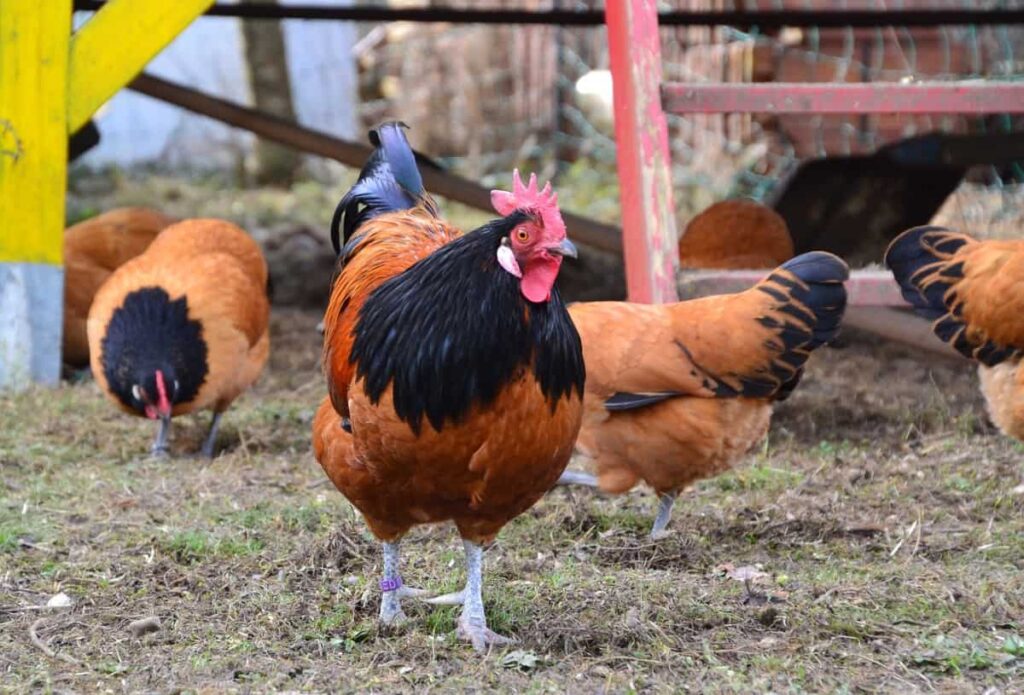
The main advantage of contract poultry farming for farmers is that it provides a guaranteed market for their chickens. This arrangement also allows farmers to focus on raising chickens rather than marketing and selling them. However, contract poultry farming can also be disadvantageous for farmers if the prices offered by the company are below the market rate or if there are strict production standards that are difficult to meet.
Popular poultry breeds in India
There are many different poultry breeds in India, each with unique characteristics. Some popular breeds include the Aseel, Kadaknath, and Rhode Island Red. The Aseel is a native Indian breed known for its strong constitution and fighting ability. Kadaknath chickens are prized for their dark meat, which is said to have medicinal properties.
Rhode Island Reds are a popular dual-purpose breed used for egg and meat production. Contract poultry farming is a type of agreement between a farmer and a company that provides chicks, feed, and other supplies. The farmer agrees to raise the birds according to the company’s specifications and sell them back to the company when they reach adulthood.
Contracting poultry farming has many benefits, including guaranteed market access for the farmer’s products and helping with financing and marketing. However, there are also some potential drawbacks, such as being locked into a long-term contract and having to follow strict guidelines set by the contracting company.
What is contract poultry farming?
Contract poultry farming is a system of producing chickens for meat (known as broilers) or eggs (layers) under a long-term contract between a poultry farmer and an integrator. The integrator provides the day-old chicks, feed, houses, and other inputs needed for production, while the farmer is responsible for raising the birds and meeting defined production targets. The contract typically lasts for one to three years. Under this system, farmers can reduce financial risks by sharing them with the integrator.
In return, they give up some control over their production decisions and earn lower profits per bird than they would if they operated independently. Contract poultry farming has been growing rapidly in India since the early 1990s. It now accounts for more than 90% of the country’s broiler chicken production and about 70% of egg production. The two leading players in India’s contract poultry industry are integrated companies and independent farmers.
Integrated companies vertically integrate all stages of poultry production, from hatcheries to processing plants. Some India’s largest integrated poultry companies are Venky’s, Suguna Foods, Amrit Group, Godrej Agrovet, and Charoen Pokphand (CP) India. These companies contract with thousands of small-scale farmers across the country to produce chicken according to their specifications. Independent farmers typically contract with one or more integrators to raise chickens.
In case you missed it: Contract Pig Farming in India: Companies, Agreement, Profits, How it Works and the Pros and Cons
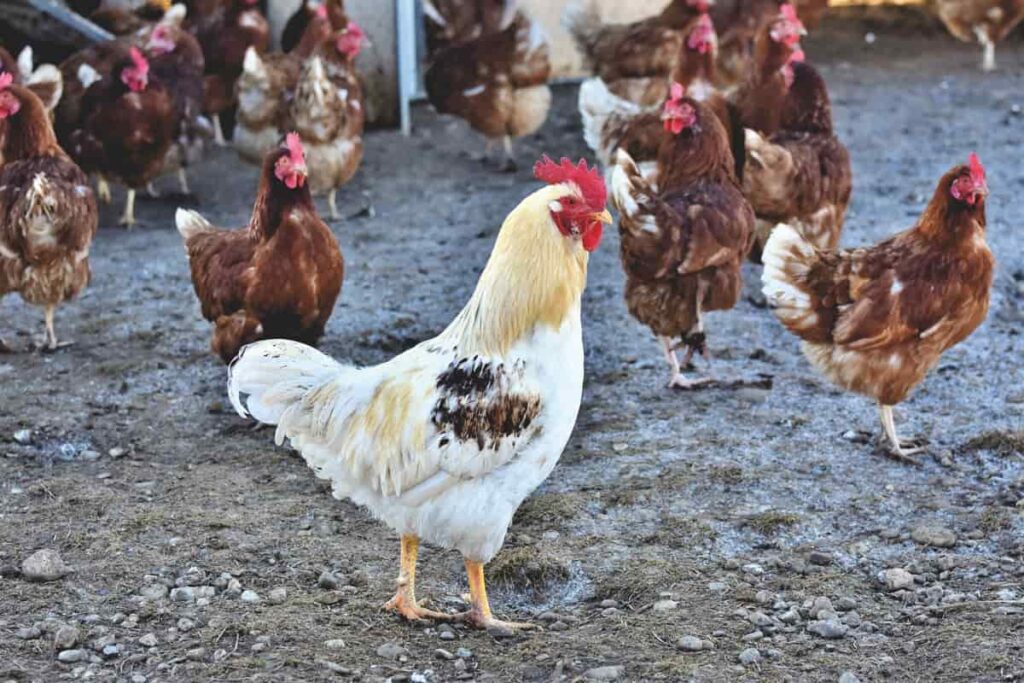
History of contract poultry farming in India
The poultry industry in India has been growing at a rapid pace over the past few years. Contract poultry farming is one of the latest trends in this industry and has become quite popular among farmers. Under this system, farmers raise chickens on behalf of companies or hatcheries and are paid for their services. This type of farming has several advantages for both the farmers and the companies.
For farmers, it provides them with a regular income and helps them to avoid the risk of investing in expensive infrastructure and equipment. It also allows them to focus on what they do best – raising chickens! For companies, contract farming helps to reduce costs and ensure a steady supply of birds. However, there are also some disadvantages to this system. One of the biggest concerns is that it can lead to very high levels of debt for farmers if they are not careful.
Another issue is that companies often have strict requirements that farmers must meet to continue working with them. This can put a lot of pressure on farmers and make it difficult for them to make a profit. Contract poultry farming is a growing trend in India with pros and cons. Farmers should consider all aspects before deciding if it is right for them.
How does contract poultry farming work in India?
In India, contract poultry farming is common for chicken producers to do business. Under this system, a company contracts with farmers to raise chickens according to the company’s specifications. The company provides the chicks, feed, and other necessary inputs and pays the farmer a fixed price per kg of live weight gain. The main advantages of contract poultry farming for companies are that it helps them to control quality and reduce costs.
For farmers, the main advantage is that it provides them with a stable income. However, there are also some disadvantages to this system. For example, farmers may not be able to sell their chickens to other buyers if the price offered by the contracting company is lower than the market price. Therefore, if you’re considering getting into contract poultry farming in India, it’s essential to understand how the system works and the pros and cons.
Profits in contract poultry farming in India
Contract poultry farming in India is a system where the poultry farmer and the company agree. Under this agreement, the company provides the farmer with day-old chicks, feed, medication, and technical know-how. In return, the farmer agrees to raise the chicks according to the company’s guidelines and sell the chicken back to the company when they are ready for slaughter.
Contract poultry farming has many advantages for both the farmer and the company. For the farmer, it provides a steady income and removes many risks associated with traditional poultry farming. The farmer does not have to worry about finding a market for their chicken, as they have already been guaranteed a buyer. They also can avoid fluctuations in prices or unexpected costs. For the company, contract poultry farming allows them to produce a consistent product at a lower cost.
However, there are also some disadvantages to contract poultry farming. One of the biggest drawbacks is that it can be challenging for farmers to get out of their contracts if they are unhappy with the terms. This can leave farmers feeling trapped and unable to negotiate better terms or improve their conditions. Additionally, because contract farmers often rely on one company for their livelihood, they can be at a disadvantage when negotiating prices or terms of their agreement.
In case you missed it: Medicinal Plants Herbs Contract Farming in India: Profits, Companies for Tulsi, Ashwagandha, Brahmi, Aloe Vera, Shatavari, and More
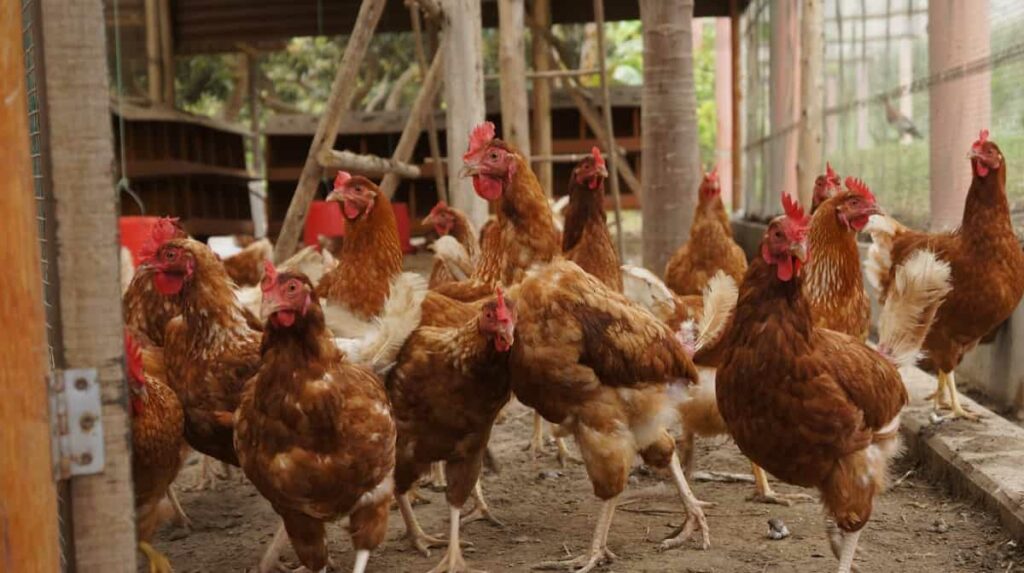
The pros and cons of contract poultry farming in India
Contract poultry farming in India has become a popular way for farmers to get into the poultry business. Many companies contract with farmers to raise chickens for them. The agreement between the farmer and the company usually stipulates that the farmer will provide the land, labor, and capital, and the company will provide the chicks, feed, and veterinary care. The farmer is also responsible for following the company’s guidelines on how to raise the chickens.
The main advantage of contract poultry farming is that it requires less capital than traditional poultry farming. The company provides the chicks and feed, so the farmer does not have to invest in these items. The other advantage is that the farmer has a guaranteed market for their chickens. The company contracts with the farmer to purchase all the chickens raised under the agreement.
The main disadvantage of contract poultry farming is that farmers have less control over their operations. The company dictates how the chickens must be raised, and if the farmer does not follow these guidelines, they may be terminated from the contract. Another disadvantage is that because the farmer has a guaranteed market for their chickens, they may be paid less than if they sold them on the open market.
Some of the biggest companies involved in contract poultry farming in India
The poultry industry in India is growing rapidly, with an annual growth rate of around 15%. This growth is driven by the increasing demand for chicken and other poultry products and the government’s initiatives to promote the sector. One of the key players in this industry is contract poultry farming. In this system, farmers produce chicken and other poultry products under a contract with a company.
The company provides the birds, feed, and other inputs and sets specifications for the end product. The farmer is responsible for raising the birds according to these specifications and delivering them to the company. There are several advantages to this system for both farmers and companies. For farmers, it provides a regular income and reduces some of the risks associated with farming.
For companies, it helps them to secure a steady supply of high-quality chicken and other poultry products. Some of India’s biggest companies involved in contract poultry farming include Venky’s, Godrej Agrovet, Suguna Foods, and Sagar Poultry. These companies have contracts with thousands of farmers across the country, and together they produce millions of chickens every year.
In case you missed it: Dairy Contract Farming in India: Companies, Agreement, Profits, How it Works and the Pros and Cons
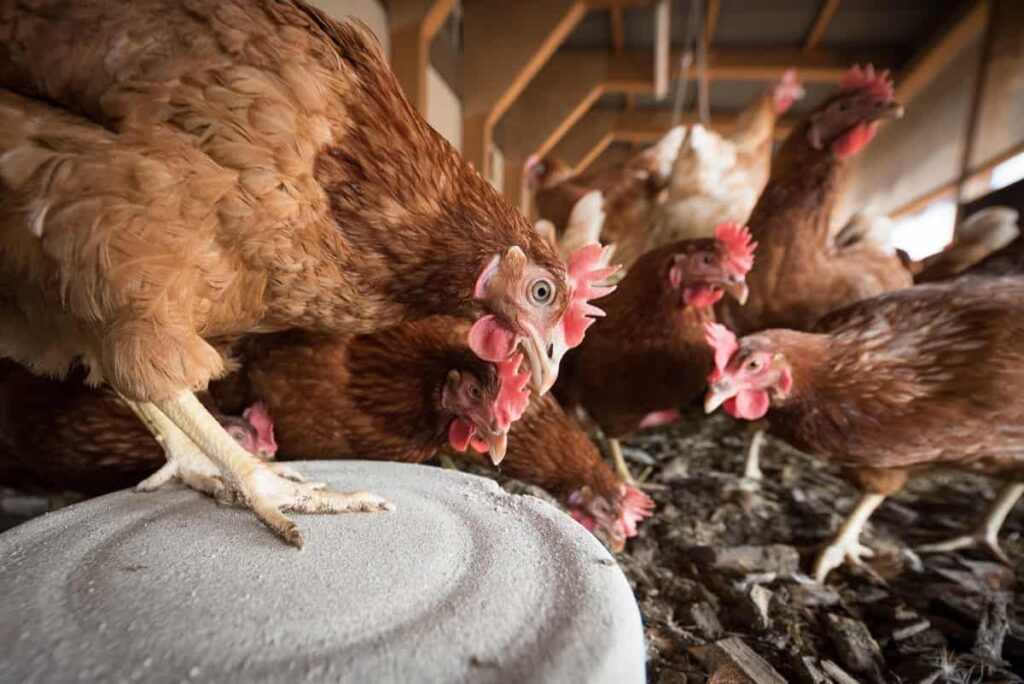
What are the conditions of the contracts between farmers and companies?
The contract between farmers and poultry companies can vary greatly, depending on the size of the operation and the specific company involved. However, some general conditions are typically included in these types of agreements. The farmer agrees to provide a certain amount of land to construct chicken coops and other necessary infrastructure. The company agrees to provide the chickens, feed, and other supplies needed to raise them.
The farmer is typically responsible for caring for the chickens and ensuring they have enough food and water. The company may also require the farmer to follow certain guidelines regarding raising chickens. The contract will typically specify how long the agreement will last and how many chickens the farmer must raise each year.
It is important to note that these contracts can be very inflexible, so farmers must be sure they can commit to the terms before signing anything. Once the contract is up, the farmer is usually required to return all of the chickens to the company. The farmer may also be responsible for paying for any damage caused to the chicken coops or other equipment during the contract period.
Conclusion
Although contract poultry farming has pros and cons, it is still a very popular method of raising chickens in India. The main reason is that it is a very profitable venture for the companies involved. However, this system has some drawbacks, such as the farmers having little control over their operations and the chickens may not be raised in the best conditions.
Overall, contract poultry farming is a widely used method of chicken production in India and will likely continue to be so in the future. If you live in the following states and plan to start a contract poultry farming in India, this blog post would greatly help beginners.
| Andhra Pradesh | Karnataka |
| Arunachal Pradesh | Kerala |
| Assam | Madhya Pradesh |
| Bihar | Maharashtra |
| Chhattisgarh | Manipur |
| Goa | Meghalaya |
| Gujarat | Mizoram |
| Central India | South India |
| Haryana | Sikkim |
| Himachal Pradesh | Tamil Nadu |
| Jharkhand | Telangana |
| Nagaland | Tripura |
| Odisha | Uttar Pradesh |
| Punjab | Uttarakhand |
| Rajasthan | West Bengal |
| North India | West India |
- Profitable Village Farming Business Ideas in 2024
- High-Yield Aquaculture: Fast-Growing Fish for Farming
- Effective Fish Pond Construction Techniques for Beginners
- Irrigation and Water Management in Pineapple Farming
- Blossom to Harvest: Mastering Flowering and Pollination in Papaya Farming
- Pig Fattening Essentials: From Selection to Sale for Beginners
- Raising Wagyu Cattle: A Complete Guide for Premium Beef Production
- Soil Types and Their Water Holding Capacity
- Optimizing Irrigation Schedules for Coconut Groves for Enhanced Yield
- Espresso Your Garden: Coffee Grounds for Healthier Acid-Loving Plants
- The Best Soil Mix for Snake Plants: How to Mix Your Own Snake Plant Soil
- Green Thumb Success: Expert Tips for Cultivating Greenhouse Beans All Year Round
- Bloom All Year Round: The Ultimate Guide to Indoor Hyacinth Care
- Eco-Friendly Gardening: How to Make Liquid Fertilizer from Kitchen Waste
- Ultimate Guide to Grow Anise in Pots: Explore Seed Propagation to Harvesting
- Guide to Raising Chester White Pigs: Discover Breed Facts to Growth Management
- Mastering the Elegance: The Ultimate Guide to Weeping Cherry Tree Care, Planting, and Maintenance
- Ultimate Guide to Planting Garlic in Grow Bags: Growing Strategies for Beginners
- How to Fix Spider Plant Leaf-Related Problems: Natural and Organic Remedies
- 10 Reasons Why Your Tulsi Plant is Shedding Leaves: Home Remedies and Solutions
- Optimizing Growth and Yield: The Advantages of Palm Bunch Ash Fertilizer
- Utilizing Neem Oil Extract as a Natural Pesticide for Hydrangea
- From Soil to Harvest: Various Ways in Which Farmers Can Use AI Tools
- Steps to Encourage and Induce Citrus Flowers: A Comprehensive Guide
- How to Fix Snake Plant Leaf-Related Issues: Natural and Organic Remedies
- Transform Your Garden into a Fragrant Oasis with Raat Ki Rani (Night Blooming Jasmine)
- Discover the Ideal Chicken Breeds for Philippine Farms
- How to Create a Poultry Egg Farm Business Plan for Profits
- Grow Lemon Cucumbers Like a Pro: Insider Techniques for Bountiful Yields
- Ultimate Guide to Caring for Your Pink Princess Philodendron: Tips for Thriving Variegation
- Areca Nut Profit Per Acre: Calculating Yield and Cost of Cultivation
- How Kaveri Chicken is Becoming a More Profitable Breed in Indian Backyards
- Transform Your Barn: 9 Steps to Convert a Horse Stall into a Chicken Coop
- Exploring Suffolk Sheep Disadvantages with Limitations and Challenges
- Guide to Solving Potted Lemon Tree Problems: How to Revive Lemon Tree in Containers
- Steps to Encourage Female Pumpkin Flowers: Best Strategies for More Flowers and High Yields

I am interested for contract poultry farming
interested in poultry farming on contract basis at dinajpur
I am intrested for contract farmig